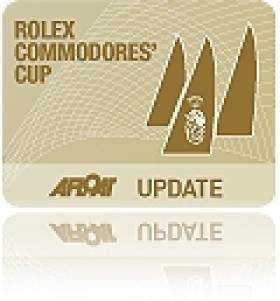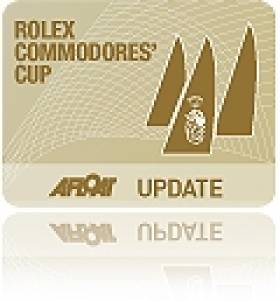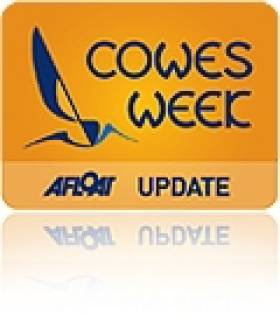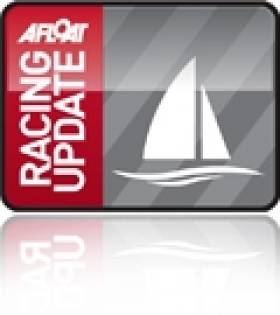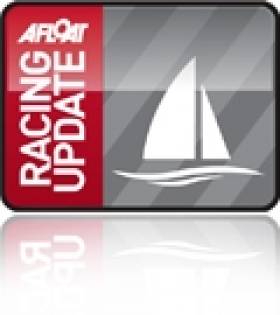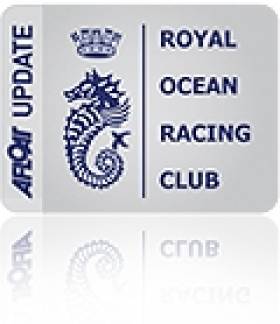Displaying items by tag: Solent
Commodores' Cup Race Tracking System HERE!
Follow all the boats racing in the Rolex Commodores' Cup 2010 on the Inshore Race Tracking System HERE!
Monday: Ireland Proceed with Care on the Solent (Podcast HERE!)
In spite of Ireland's domination of the first races of the Commodore's Cup, Irish Cruiser Racer Association (ICRA) Commodore Barry Rose says it is far too early for celebration in the Irish camp. After all they have been here before a number of times. Hear the latest from Rose this morning as the teams go afloat for a breezy two races today, exactly the sort of conditions that favour the Irish trio.
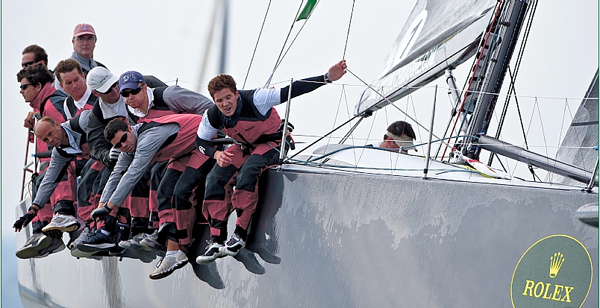
Ireland's Antix in action. Her crew inlcudes last week's Skandia Sail for Gold Regatta winner Peter O'Leary. Photo: Kurt Arriga
Cowes Week Radio Now Online!
Cowes Radio celebrates 25 years at the worlds' greatest regatta, Cowes Week, and goes on air this Friday on 87.7FM as the longest running RSL station in the UK. New on the website this year is Flash streaming on the eDigital Research sponsored webpages www.cowesradio.co.uk/listen <http://www.cowesradio.co.uk/listen>, as well as feeds for every kind of web player. There's even some new links to listen to Cowes Radio on your iPhone or Blackberry, which means you really can listen to Cowes Radio everywhere!
On air competitions include: a week's holiday yacht charter in the BVI with a day's tuition by top match racer Peter Holmberg; Mount Gay Rum 'Crew of the Day' and 'Hunt the Barrel' daily competitions, some nice shades from sunglassesforsport.com and trendy, adaptable, multi-use headwear Buffs.
For more information, check out www.cowesradio.co.uk
Round the Island Ends on High Note
Everyone is celebrating this year’s Race as being one of the most successful on record. Not only did the weather gods play fair, the racing was extremely close throughout the day proven by the tight finishes in most classes and the competitors came ashore happy and proud of their efforts whether first in class or trailing the fleet.
For once, most of the boats finished before sunset and in a fleet of nearly 1700 boats, that’s pretty unusual.
From the 0500 start off the Royal Yacht Squadron line when ICAP Leopard, the current monohull course record holder powered her way up the Solent to the Needles, right through to the closing stages of the race, there was little time for the race management team at the Island Sailing Club to draw breath in order to record the finish times.
The two existing course record holders in the J.P. Morgan Asset Management Round the Island Race have again triumphed today as IDEC, the multihull driven by Francis Joyon crossed the finish line at 09.34.05 - so her rounding was in 04h.24m.05s and her course record still stands at 3h.08m.29s. She was closely followed by the four Extreme 40s led by Oman Sail, The Wave Muscat at 09.37.33, then Oman Sail Masirah at 09.37.57, Team Metherell at 09.44.10 and then Ecover at 09.48.45.
ICAP Leopard crossed the line at 10.10.06 so her rounding was achieved in 05h.0m.06s, way outside her record of 03h.53m.05s. The ISC Commodore Bill Pimlott presented Mike Slade with a bottle of Champagne for taking the monohull line honours. Mike, chatting after the race, said: "We've had a glorious day's sailing as always and we're exceptionally pleased with the result considering we got hooked up to a lobster pot on the south of the Island for about two hours. Thankfully we had a young diver onboard who free-dived below and cut it off. We thought we had slowed up and when we saw the size of the obstacle we realised why. Sadly there was nothing in it!"
The exquisite J Class yacht Velsheda finished at 10.45.02. She started at 5am this morning. Built in 1933 in Camper and Nicholsons in Gosport, Velsheda is the most famous of the few remaining J Class yachts left in the world today.
Just after 1pm Simon Judge sailing his Westerly GK29 Growling Kougar was carefully treading his way over Ryde Sands with just one metre of water below the keel. "We're going well and seem to have caught up on some of the Sunsail fleet yachts, and have a few of Sigma 33s close by which is good for us because they rate higher." According to Judge he was currently in line to break his own Round the Island Race record which stood at nine hours. "If all goes well, we'll be in within eight and a half hours." We’re delighted to report that he made it in 8.48.40!
Angus Ball, the Gunboat 66 Coco de Mer skipper in the Multihull-Bridgedeck class, said they had an exciting time and were pleased to be mixing it with some of the Class 0 yachts that started 10 minutes ahead. Ball and his team have been campaigning the year-old boat extensively and have notched up some respectable results including a Gunboat class win at the Heineken Regatta earlier in the year.
The Silver Gilt Roman Bowl and JP Morgan Asset Management Salver for the top yacht in the ISC Rating System Division went to First Knight, a Beneteau First 25.7 owned and skippered by an ENT surgeon, Lindsey Knight, from Leeds.
Next year the race is taking place on Saturday June 25th. Importantly this will be the 80th Anniversary Race and the organisers are anticipating a record entry.
Full results and the Race Progress news from this year are on the Race website at
http://www.roundtheisland.org.uk.
The prizegiving is being held tomorrow, Sunday 20th June at the Island Sailing Club and all are welcome.
Folkboat Wins Round the Island Race
Ten hours since the first gun was fired in the 2010 J.P. Morgan Asset Management Round the Island Race, and finishing yachts are streaming into Cowes with half of the 1754 entries having completed the 50-mile marathon.
Unusually we have the winner of the Gold Roman Bowl, the top prize in the Race for the first overall on corrected time in IRC-rated classes. Nordic Bear is a Nordic Folkboat owned and raced by Brian Appleyard from Huntingdon in Cambridgeshire. He came second in IRC overall in 2009. This boat has beaten Madelaine who won the Gold Roman Bowl in 2007.
Since Francis Joyon’s IDEC claimed outright line honours as first multihull home in 04. 24.05 and first monohull ICAP Leopard completed her lap of the Isle of Wight half an hour later (05.0.06), the majority of the IRC fleets have also finished.
In IRC 0 the J-Class Velsheda is the provisional winner, with triple Olympic gold medallist Ben Ainslie second onboard J.P. Morgan Asset Management Prince’s Trust, and the Swan Desperado in third.
First overall in IRC1 is Willem Wester’s Grand Soleil 43 Antilope, ahead of the J/122 Jinja and Incognito. Antilope also heads up the IRC1A division, Incognito tops IRC1C, whilst IRC1B is led by Andy Iyer’s Beneteau First 40.7 Portia.
David Mcleman’s J/109 leads IRC2 and division 2B overall, with the Grand Soleil 37 Grand Slam topping IRC2A, the well travelled Dutch entry Winsome leading IRC2C, and Dave Cooke’s Sigma 38 Monet first in IRC2D.
Many of the larger ISC-rated boats have also finished their race, with first home the Bordeaux 60 Osprey of Nickolas Imregi, which also provisionally leads the ISC4 fleet on corrected time.
However, the winner of the 79th Round the Island Race could well still be racing – many of the Nordic Folkboats, Quarter Tonners and other classes traditionally successful in the competition for the famous Gold Roman Bowl IRC overall prize are currently sailing the final section of the race from Ryde to Cowes, and early indications are that 2010 could be another year when conditions favour the small boats.
Competitors have until 2200 to complete their race within the time limit, but winds in the Solent are still averaging 12-18 knots to speed the fleet home to the Island Sailing Club finish line.
Comm Cuppers Round Island, not Ireland
Two of the three boats in Ireland's Commodore's Cup team are booked in for the annual Round the Island race in the Solent on June 19. The race, which already boasts 1,200 entries, kicks off the day before the Round Ireland, which is struggling to make the 20-entry mark at present.
Anthony O'Leary's Antix and the new Crosshaven-based Corby, Roxy 6 appear in the 399-boat IRC lineup.
Racing 50 miles around the Isle of Wight will no doubt be beneficial for the teams aboard both boats ahead of August's Commodore's Cup, and six Irish boats feature in the IRC section. However, the clash calls into question the timing of the Round Ireland. With the Round the Island, the single most popular sailing event in the British Isles every year, taking place on the solstice weekend, the Round Ireland puts itself at a serious disadvantage in seeking entries at that time.
The chance of tempting boats up from the Solent is lessened, when skippers are faced with a shorter, cheaper and more sociable event at home. And with the Solent a similar distance from Cork, It's no surprise that two of the top boats in Ireland, both based in Cork, have decided to use it as a training event for the Commodore's Cup.
Insiders have already grumbled that this point is one Wicklow needs to address going into the next Round Ireland cycle.
Share your thoughts on Afloat.ie's forum.


























